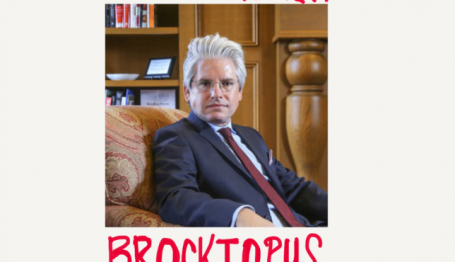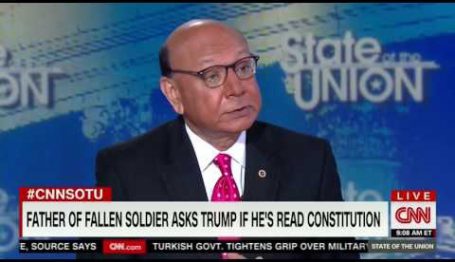2016 Conventions
Trump rips Clinton, pledges to fight for working Americans
CLEVELAND, OHIO —In every country, Thomas Jefferson wrote Henry Lee, there exist two parties: “Those who fear and distrust the people, and wish to draw all powers from them into the hands of the higher classes,” and “Those who identify themselves with the people, have confidence in them, cherish and consider them as the most honest and safe, although not the most wise, depositary of the public interests.”
Tonight, Donald J. Trump laid claim to leadership of the second group—the one that represents and speaks for regular people. It’s an extraordinary claim, coming from a billionaire. Then again, he’s running against Hillary Clinton, who epitomizes the first group.
Introducing her father, Ivanka Trump declared: “Other politicians see the unfairness of it all and say, ‘I feel for you.’ Only my father will say, ‘I’ll fight for you.’” Another speaker, earlier in the evening, called Trump “America’s blue-collar billionaire.”
Trump’s acceptance speech painted a picture of “Big Business, elite media, and major donors” who are “lining up behind the campaign of my opponent,” Hillary Clinton, “throwing money at her” because “she’s their puppet, and they pull the strings” He’s running for president, he said, “so that the powerful can no longer beat up on people who cannot defend themselves.”
The system is corrupt, he said, and “Nobody knows the system better than me. Which is why I alone can fix it.”
Highlighting the Republican Party’s abrupt turn toward populism, and toward the working class and small business class, this year’s convention was boycotted by the highest members of the GOP Establishment, including Mitt Romney, John McCain, and Presidents George W. and George H.W. Bush. Among living Republican presidential nominees, only former Senator Bob Dole (Kansas), age 92, attended. Trump is the first non-Establishment candidate to win the party’s nomination since Ronald Reagan sought and won reelection in 1984.
Trump, in his speech, characterized himself as the candidate of the bricklayer, the steelworker, and the cop on the beat, in contrast to Hillary Clinton, who has made herself rich not by building buildings or creating jobs but through influence peddling and corruption. At one point, the audience began to chant, “Lock her up! Lock her up!” and an unusually restrained Trump responded: “Let’s defeat her in November!”
He pointed to the effect of Establishment policies on inner cities–poverty, unemployment, poor education, crime. He referred to himself no fewer than four times as the candidate standing for “law and order.” From the Iran deal to the rise of ISIS to the disaster in Libya, a series of events that some have described as “setting the world on fire,” Trump laid President Obama’s foreign policy debacles largely at the feet of Obama’s secretary of state. “This is the legacy of Hillary Clinton: death, destruction, terrorism, and weakness.”
On taxes, the national debt, and other economic issues important to movement conservatives, Trump took standard conservative positions, but with a verve lacking in the rhetoric of recent nominees. He promised: “With these new economic policies, trillions of dollars will start flowing into our country. This new wealth will improve the quality of life for all Americans. We will build the roads, highways, bridges, tunnels, airports, and the railways of tomorrow. This, in turn, will create millions more jobs. We will rescue kids from failing schools by helping their parents send them to a safe school of their choice.” The last phrase, emphasized by Trump, signaled his support for “school choice,” the right of parents to pick their children’s schools, strongly opposed by teachers’ unions, which back Clinton.
Trump hit hard at Obama/Clinton policies on his signature issues, illegal entry/immigration and “bad trade deals,” including NAFTA, China’s admission into the World Trade Organization, both supported by Bill and Hillary Clinton, and the Trans-Pacific Partnership, which Hillary Clinton used to support. (Clinton’s position on TPP is unclear. Once a supporter, she seemed to turn against it, but her forces blocked an anti-TPP plank in this year’s Democratic platform.) Those who’ve lost their jobs through such deals are the “the forgotten men and women of our country . . . but they’re not going to be forgotten any longer!”
The Republican nominee took dead aim at one of the key vulnerabilities in the Democratic coalition: the support of Hillary Clinton and the Left for policies that enable and empower Islamofascists, whose intentions for the LGBT (or LGBTQ) community range from beating and imprisonment to beheading and, in ISIS’s preference, being thrown off tall buildings.
“Only weeks ago, in Orlando, Florida, 49 wonderful Americans were savagely murdered by an Islamic terrorist. This time, the terrorist targeted [the] LGBTQ community. No good. And we’re going to stop it. As your president, I will do everything in my power to protect our LGBTQ citizens from the violence and oppression of a hateful foreign ideology. Believe me.” The crowd cheered and chanted, “USA! USA!”—leading Trump to ad lib: “And I have to say, as a Republican, it is so nice to hear you cheering for what I just said. Thank you.”
(Earlier in the evening, speaking in support of Trump, PayPal co-founder Peter Thiel had declared himself proud to be gay and a Republican, but “most of all, I am proud to be an American.” Thiel received a standing ovation and those “USA!” chants.)
Perhaps mindful that some Republicans won’t be happy with his approach to LGBT-related issues, and mindful of the need to get the party’s Ted Cruz wing behind his candidacy, Trump pointed to his running mate, Mike Pence. On the Trump/Pence ticket, Pence represents Republicans who are conservative on both economic and social issues. The Indiana governor has taken heat from left-wing LGBT activists and corporations for his support of legislation that was intended to protect religious freedom for caterers, wedding photographers, and others who would might choose not to participate in same-sex weddings. Polls suggest that fewer than 10 percent of Americans oppose religious freedom for people in such a situation.
Returning to his populist theme, Trump noted that the catchphrase of the Hillary Clinton campaign is “I’m with her!” His response: to say to Americans, “I’m with you!”
“So to every parent who dreams for their child, and every child who dreams for their future, I say these words to you tonight: I’m with you, I will fight for you, and I will win for you “I am with you, I will fight for you, and I will win for you!”
Trump’s conclusion: “We will make America strong again, we will make America proud again, we will make America safe again, and we will make America great again!”
The speech was interrupted by one protester, a woman from the pacifist group Code Pink. Overall, it was roughly 76 minutes long—the longest presidential nomination speech in memory. (Pundits cited records going back to 1956.) The previous record-holder should come as no surprise: Bill Clinton, in 1996, at just under 65 minutes.
Trump’s populist theme even extended to the dress worn by his daughter, Ivanka, as she introduced him. She designed it herself, and it cost $158.



